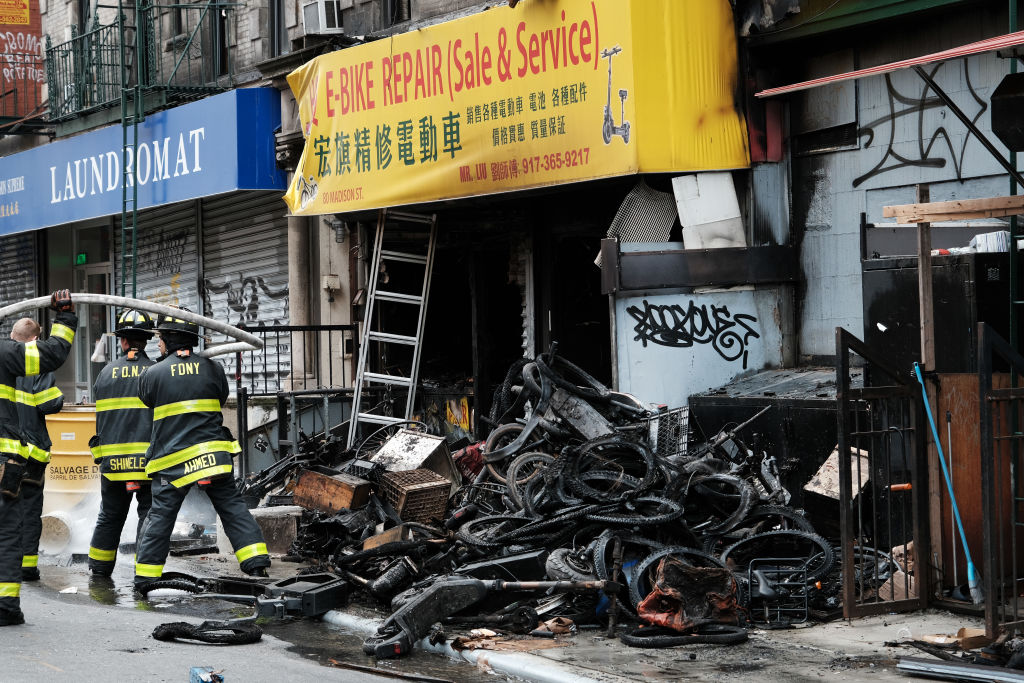Here’s what we know about the Atlanta ‘Cop City’ protests
he construction of “Cop City,” including environmentalists who are concerned about the destruction of the Weelaunee Forest. The forest is home to several endangered species, and activists argue that the construction of the center would have a devastating impact on the local ecosystem.
The Rise of the “Stop Cop City” Movement
What began as local opposition to a police training center in Atlanta has turned into a nationwide movement against police brutality and environmental destruction. The “Stop Cop City” movement has gained momentum in recent months, with activists across the United States calling for an end to the construction of the Public Safety Training Center.
The movement has not been without controversy, however. There have been reports of violence and arrests on charges of domestic terrorism, and one protester was shot and killed by police officers. The incident has only fueled residents’ anger and frustration with the construction of “Cop City.”
What is “Cop City?”
“Cop City” refers to the proposed Public Safety Training Center, an 85-acre compound intended to train police officers, firefighters, and 911 operators on how to serve the Atlanta communities. The center is slated to be built within a 300-acre forest in an unincorporated area of DeKalb County.
The new center is expected to include a mock city, a firing range, a driving course, stables and pastures for police horses, and kennels for K-9 dogs. However, activists argue that the construction of the center would have a devastating impact on the local ecosystem and the Weelaunee Forest, which is home to several endangered species.
Why are people upset with the “Cop City” installation?
Residents of Atlanta, especially those in the black and low-income communities, have been calling for new methods of public safety in the wake of the deaths of George Floyd, Tyre Nichols, and Rayshard Brooks at the hands of police officers. However, the construction of “Cop City” is not what they had in mind.
The Atlanta City Council voted to lease 85 acres of the Weelaunee Forest to the Atlanta Police Department in September 2021, despite 17 hours of negative public comment. Activists argue that the construction of the center would only exacerbate the problem of police brutality and would have a devastating impact on the local ecosystem.
The “Stop Cop City” Movement
The “Stop Cop City” movement has gained momentum in recent months, with activists across the United States calling for an end to the construction of the Public Safety Training Center. The movement has been fueled by concerns about police brutality and environmental destruction, and activists argue that the construction of “Cop City” would only make these problems worse.
As the movement continues to grow, it remains to be seen whether the construction of “Cop City” will proceed as planned or whether activists will be successful in stopping it.
Stop Cop City: The Controversial Training Center in Atlanta
The construction of the training center, which includes Stop Cop City and Defend the Atlanta Forest, has sparked controversy in Atlanta. According to DTF’s website, the project has been criticized for “ecological destruction and racialized violence.”
Despite the training center’s website stating that it is not for militarized police training, many residents are concerned that it will only escalate violent encounters between police and community members, particularly young black men.
“To be clear — cop city is not just a controversial training center. It is a war base where police will learn military-like maneuvers to kill black people and control our bodies and movements,” said Kwame Olufemi of Community Movement Builders via the Stop Cop City website. “They are practicing how to make sure poor and working-class people stay in line.”
The DeKalb County Zoning Board initially agreed to hear an appeal for the construction project, but ultimately sided unanimously in favor of the Atlanta City Council.
Environmental Concerns
Another argument against the training center is that it will be harmful to the environment. The South River Watershed Alliance filed a petition to appeal the Georgia Environmental Protection Division’s decision to revoke a permit for the future training center site, citing concerns about water pollution from stormwater runoff during construction.
Jacqueline Echols, a member of the alliance, called the training center construction an “awful, environmentally degrading project” and advocated for the project to move out of the forest area. The alliance is also in the process of filing an appeal with the DeKalb County Superior Court to appeal the center contractors’ permit.
Echols emphasized that the alliance’s goal is not to prevent police training, but to prevent damage to the area. “It’s not about training Atlanta’s police, it never was, because that can happen without destroying green space, without destroying the community,” she said.
Timeline of Protests and Arrests
Opposition to the construction of the training center turned from peaceful protesting to violence. The beginning of Atlanta residents’ opposition to police came in June 2020, less than a month after George Floyd was killed. Rayshard Brooks was shot and killed by police after he resisted arrest, grabbed a police taser, and aimed it at an officer.
The controversy surrounding the training center continues, with concerns about both its potential impact on the environment and its potential to escalate violent encounters between police and community members.
The Battle for Atlanta’s Forest: A Story of Activism and Violence
The Beginning
It all started with the death of Rayshard Brooks, a Black man who was shot and killed by police officers in a Wendy’s parking lot on June 12, 2020. Despite public outcry, prosecutors declined to charge the officers involved. The Atlanta City Council awarded $1 million in reparations to Brooks’s wife, but for many activists, it wasn’t enough.
A makeshift group of professional environmental justice activists, abolitionists, and anarchists began camping in a forest, occupying the trees in treehouses. They were determined to stop the construction of a new police training center on the site, which they saw as a symbol of police brutality and systemic racism.
The Occupation
During their time in the forest, activists vandalized work trucks and broke windows to discourage the contractors from their work, as well as set fire to equipment. They were willing to do whatever it took to protect the trees and stop the construction.
In May 2022, police arrived to begin removing protesters from the forest. Officers were met with rocks, Molotov cocktails, and other projectiles. Activists had also vandalized a truck, writing “stop cop city” on it. It was stripped for parts and burned. “Innumerable trees” were “spiked,” an illegal act involving the placement of rods and nails into the trees intended to destroy saws or injure workers. Police made seven arrests.
The Escalation
Months later, five people were arrested and charged by the Georgia Bureau of Investigation with domestic terrorism in December 2022 after agents arrived to remove barricades and obstacles blocking entrances to the future training center grounds. The charges included criminal trespassing, domestic terrorism, aggravated assault, and obstruction. All five were members of DTF.
In January, the situation escalated dramatically, resulting in the death of 26-year-old Manuel Esteban Paez Teran, who was shot and killed on Jan. 18 in a shootout with police that also injured a Georgia State Patrol officer during a sweep of the protester’s forest encampment. State officials had claimed self-defense, but the shooting remains under investigation. A report from the DeKalb County Medical Examiner’s Office determined that Teran had sustained at least 57 gunshot wounds.
The Fallout
In January, 49 organizations called for the resignation of Democratic Mayor Andre Dickens for his response to Paez Teran’s death and overall police presence in Atlanta. “Mayor Dickens has stood by as police violence and rhetoric towards protesters has steadily ratcheted up, including the use of chemical agents and militarized raids on small groups of protesters engaged in civil disobedience,” the organizations wrote in an open letter.
In March, at least 23 people were charged with domestic terrorism after a protest turned violent. Protesters had launched Molotov cocktails, bricks, and fireworks at law enforcement officers. Police arrested a total of 35 people from that protest, which only included two Georgia residents. The rest were from other states, and two were from out of the country. “This was not a protest,” Atlanta Police Department officials had said. “This wasn’t about a public training center; this was about anarchy.”
Several historically black colleges and universities across the U.S. have joined protesters in denouncing the training center project since February. On Monday, students from Emory University, Georgia State University, Agnes Scott College, Morehouse College, Georgia Institute of Technology, Spelman College, and Clark Atlanta University…
Activists Protest Against Atlanta’s Cop City Training Center
Atlanta-based activist group, Ty, staged a protest calling on Atlanta officials to cancel the lease and drop ties with the Atlanta Police Foundation. According to a press release provided to the Washington Examiner, the group believes that the proposed Cop City training center will only result in more death and destruction at the hands of the police.
Support from Elected Leaders
Despite the protests, Atlanta City Council’s project has received support from elected leaders. Mayor Dickens has thrown his support behind the project and created the South River Forest and Public Safety Training Center Community Task Force to seek further input from the community. The goal of the center is to help prepare officers for situations in modern-day America, such as mass shootings and convenience store robberies. Both Democratic and Republican state leaders have also weighed in on the training center’s construction.
Preventing Inefficient and Ill-Trained Officers
Democratic state Sen. Elena Parent believes that the training center can help prevent inefficient and ill-trained officers. She drew an example from Paez Teran’s death and stated that it is much better to have well-trained and well-paid law enforcement officers. However, the activist group Ty believes that the proposed Cop City training center will only lead to more violence and death at the hands of the police.
Statements from Officials
The Washington Examiner reached out to the activist movements and the Atlanta Police Foundation for statements. The Atlanta Police Department declined to comment. Governor Brian Kemp also supports the training center and is vocal about prosecutors seeking justice in cases where protesters are arrested on charges of domestic terrorism.
CLICK HERE TO READ MORE FROM THE WASHINGTON EXAMINER
" Conservative News Daily does not always share or support the views and opinions expressed here; they are just those of the writer."




